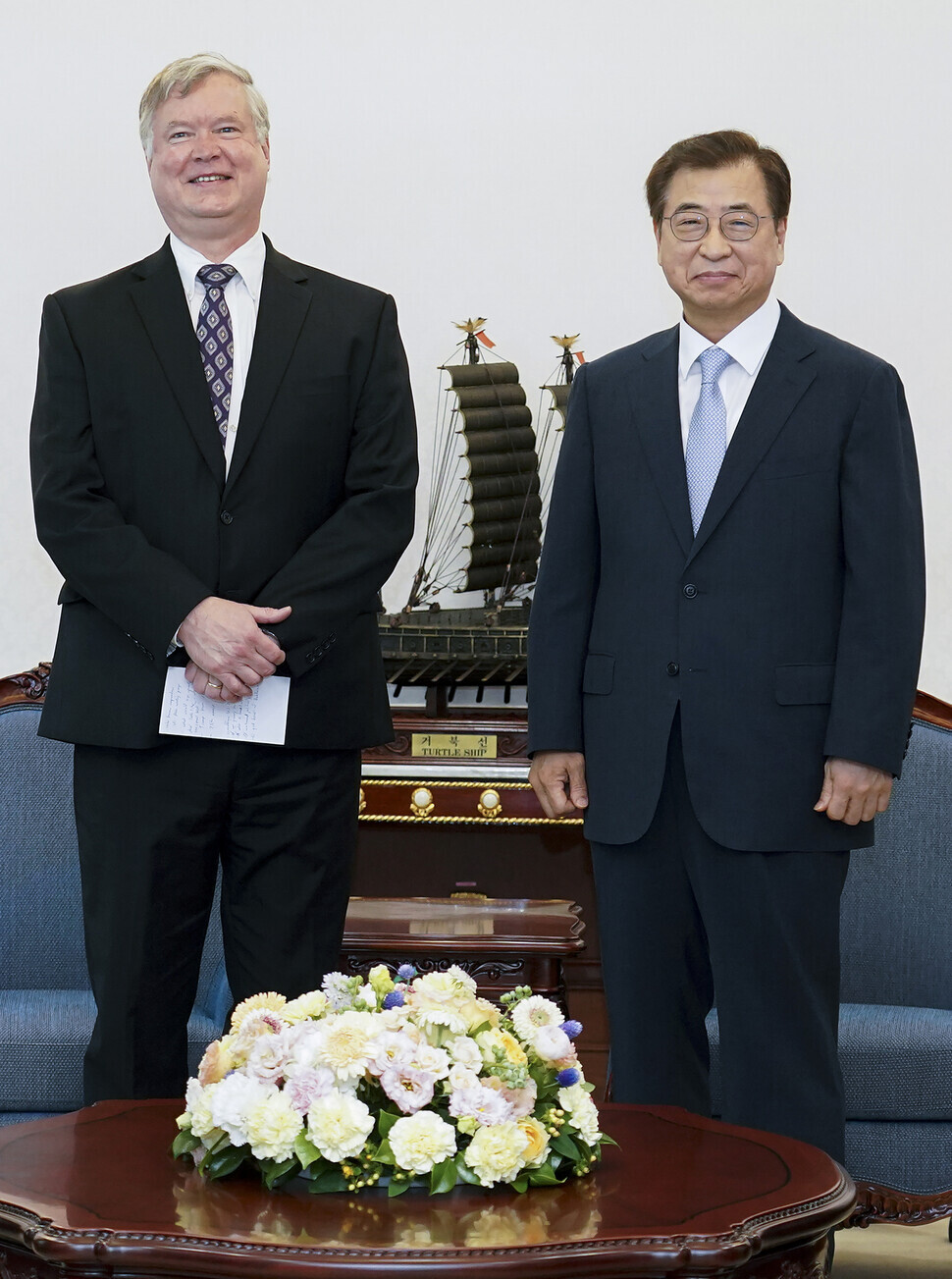hankyoreh
Links to other country sites 다른 나라 사이트 링크
[News analysis] Biegun’s remarks support inter-Korean cooperation but offer no concrete solutions

US Deputy Secretary of State Stephen Biegun, who also serves as Washington’s special representative for North Korea, headed to Japan on July 9 after wrapping up a three-day trip to South Korea. Although Biegun expressed a conciliatory message that the US strongly supports inter-Korean cooperation during his stay, experts say his message lacked the specificity to break the impasse in North Korea-US dialogue or create an impetus for improving inter-Korean relations. A former high-ranking official in the South Korean government said that Biegun’s message wasn’t specific enough to convince North Korea to take action.
“[Biegun’s] visit was designed to contain the situation on the Korean Peninsula, which has been destabilized by North Korea’s demolition of the inter-Korean joint liaison office in Kaesong and other recent developments,” said Kim Jun-hyeong, director of the Korean National Diplomatic Academy.
While experts praised Biegun for expressing support for inter-Korean cooperation and refraining from using language about North Korea’s complete denuclearization during his visit to South Korea, they concluded that ultimately, the sole purpose of his visit was to keep an unstable situation under control. Experts pointed out that Biegun’s statement during the press conference on July 8 did not contain any specifics about the inter-Korean cooperation projects that the South Korean government is pursuing or the economic sanctions relief demanded by North Korea.
“North Korea can meet with the South or the US when there are issues that can actually be implemented. Biegun appears to have simply reiterated [the US’] default position,” the former official said.
For the moment, the chances are low that a third North Korea-US summit will be held prior to the US presidential election, which is scheduled for November. North Korea likely considers it rash to continue the negotiations when it’s uncertain whether US President Donald Trump will even be reelected. The Trump administration is more likely to attempt to maintain the status quo and prevent North Korean provocations that could have a negative impact on the election than to make concessions, such as easing sanctions on the North, prior to the election.
“North Korea isn’t likely to make a move until it becomes clear whether or not Trump will be reelected. If Trump is reelected, they’ll probably make another attempt to resolve the situation through the “top down” method. But if the tide turns in the favor of the Democrats, North Korea could also carry out a major provocation,” said Kim Jung, a professor at the University of North Korean Studies.
During his trip to South Korea, Biegun criticized Vice Foreign Minister Choe Son-hui, who has taken a harsh stance on negotiations with the US, as being “locked in an old way of thinking” while obliquely asking North Korean leader Kim Jong-un to appoint a new top negotiator for its talks with the US.
But it doesn’t seem likely that North Korea will do so. “Things could be different if the US were to specify what actions it’s willing to take, but I don’t think that [North Korea] will replace its top negotiator without a good reason,” the former official said.
On the morning of his final day in South Korea, Biegun sat down at the Blue House with Suh Hoon, the new director of the National Security Office, for a meeting that lasted for one hour and 10 minutes. The two officials expressed agreement about working to resume North Korea-US dialogue and quickly concluding negotiations about their defense cost-sharing agreement. Biegun didn’t have a chance to meet South Korean President Moon Jae-in, who spent the morning visiting SK Hynix in Icheon, Gyeonggi Province.
By Noh Ji-won and Seong Yeon-cheol, staff reporters
Please direct comments or questions to [english@hani.co.kr]

Editorial・opinion
![[Column] Season 2 of special prosecutor probe may be coming to Korea soon [Column] Season 2 of special prosecutor probe may be coming to Korea soon](https://flexible.img.hani.co.kr/flexible/normal/500/300/imgdb/original/2024/0426/3317141030699447.jpg) [Column] Season 2 of special prosecutor probe may be coming to Korea soon
[Column] Season 2 of special prosecutor probe may be coming to Korea soon![[Column] Park Geun-hye déjà vu in Yoon Suk-yeol [Column] Park Geun-hye déjà vu in Yoon Suk-yeol](https://flexible.img.hani.co.kr/flexible/normal/500/300/imgdb/original/2024/0424/651713945113788.jpg) [Column] Park Geun-hye déjà vu in Yoon Suk-yeol
[Column] Park Geun-hye déjà vu in Yoon Suk-yeol- [Editorial] New weight of N. Korea’s nuclear threats makes dialogue all the more urgent
- [Guest essay] The real reason Korea’s new right wants to dub Rhee a founding father
- [Column] ‘Choson’: Is it time we start referring to N. Korea in its own terms?
- [Editorial] Japan’s rewriting of history with Korea has gone too far
- [Column] The president’s questionable capacity for dialogue
- [Column] Are chaebol firms just pizza pies for families to divvy up as they please?
- [Column] Has Korea, too, crossed the Rubicon on China?
- [Correspondent’s column] In Japan’s alliance with US, echoes of its past alliances with UK
Most viewed articles
- 1‘We must say no’: Seoul defense chief on Korean, USFK involvement in hypothetical Taiwan crisis
- 2AI is catching up with humans at a ‘shocking’ rate
- 3[Column] Season 2 of special prosecutor probe may be coming to Korea soon
- 4Division commander ordered troops to enter raging flood waters before Marine died, survivor says
- 5Is Japan about to snatch control of Line messenger from Korea’s Naver?
- 6The dream K-drama boyfriend stealing hearts and screens in Japan
- 7Korea protests Japanese PM’s offering at war-linked Yasukuni Shrine
- 8“Korea is so screwed!”: The statistic making foreign scholars’ heads spin
- 9‘Weddingflation’ breaks the bank for Korean couples-to-be
- 10Korea sees more deaths than births for 52nd consecutive month in February